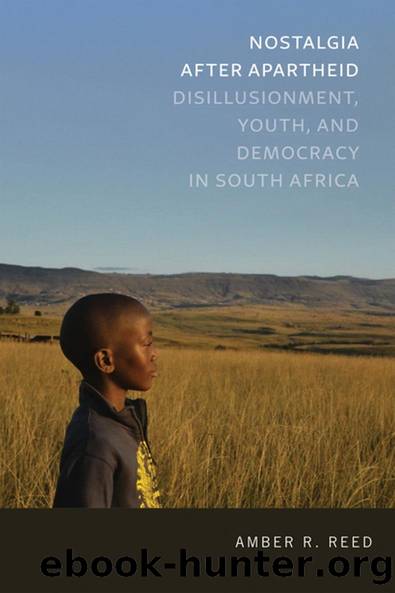Nostalgia after Apartheid by Amber R. Reed

Author:Amber R. Reed [Reed, Amber R.]
Language: eng
Format: epub
ISBN: 9780268108779
Google: BwVDzQEACAAJ
Barnesnoble:
Goodreads: 51113432
Publisher: University of Notre Dame Press
Published: 2020-01-15T00:31:03+00:00
CASE STUDY 2: âEMPOWERMENTâ THROUGH VISUAL MEDIA
In 2008, Sonke partnered with the Silence Speaks program from California on a âdigital storiesâ project in the Kamva area (in addition to other sites around the country) that trained youth in digital video production and culminated in individual short videos using mixed media that highlighted young peopleâs challenges in their communities.5 Much in the way that Sonke employees structure their alignment with the liberal message of democratic equality across lines of gender and generation, young peopleâs narratives of community problems in these videos largely fit into Western modes of personal salvation, liberal enlightenment, and individual agency. Program participants uniformly spoke in positive terms about the program, and it is not my intention here to minimize the importance it had to those young people. Instead, I wish to analyze the ideological structure on which the Digital Stories program rested. The project relied on particular forms of narrative structure that crafted a story very different from the kinds of stories most young Xhosa people are encouraged to tell openly. Another facet of interest here is that reports of the program by former participants echo some of the same issues with sustainability as those of the Peer Educator Program. Mangaliso, a young man from the Kamva area who participated in the Digital Stories project, explained his experience with Sonke: âI thought [before,] âOkay fine, a man can cook, but itâs not important ritually.â And when I met with Sonke my mind completely changed. I mean if you are surrounded by people who are stereotyping, you end up also stereotyping. They say if thereâs only one potato rotten in a bag they all get rotten. And I donât think I can ever stereotype now, because everyone is equal. What you can do, I can also do.â The young man describes those not yet reoriented to the Sonke message as ârotten potatoesâ and structures his personal transformation around notions of democratic equality and gender transformation. His story profiles resistance to nontraditional gender roles in his community, particularly cooking. While in the beginning of the story he is ostracized for doing âwomenâs choresâ such as making dinner at home, by the end his peers have seen the value in his ability to cook and seem converted to this message of gender equality. He brings his food to school and earns praise from his friends. Some of them even begin to cook as well, saying that it will attract girls and increase their popularity. Mangaliso spoke highly of the experience in the program as life-changing and formative.
His thoughts on Sonkeâs long-term impact in the community were far more ambivalent, as the epigraph to this chapter suggests.
Download
This site does not store any files on its server. We only index and link to content provided by other sites. Please contact the content providers to delete copyright contents if any and email us, we'll remove relevant links or contents immediately.
| Central Africa | East Africa |
| North Africa | Southern Africa |
| West Africa | Algeria |
| Egypt | Ethiopia |
| Kenya | Nigeria |
| South Africa | Sudan |
| Zimbabwe |
Goodbye Paradise(3810)
Men at Arms by Terry Pratchett(2838)
Tobruk by Peter Fitzsimons(2518)
Borders by unknow(2315)
Arabs by Eugene Rogan(2299)
Pirate Alley by Terry McKnight(2221)
More Than Words (Sweet Lady Kisses) by Helen West(1867)
Belonging by Unknown(1858)
It's Our Turn to Eat by Michela Wrong(1731)
The Biafra Story by Frederick Forsyth(1656)
The Source by James A. Michener(1613)
Botswana--Culture Smart! by Michael Main(1602)
Coffee: From Bean to Barista by Robert W. Thurston(1546)
A Winter in Arabia by Freya Stark(1538)
Gandhi by Ramachandra Guha(1532)
The Falls by Unknown(1527)
Livingstone by Tim Jeal(1489)
The Shield and The Sword by Ernle Bradford(1409)
Africa: Altered States, Ordinary Miracles by Richard Dowden(1385)
